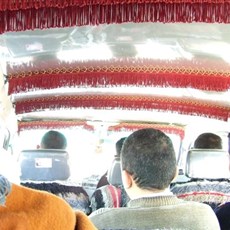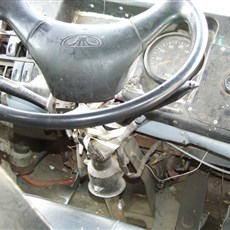2006 Egypt
26 December 2006, Tuesday; Marsam Hotel,
Luxor, LE130 (incl)
What a day we had. Long and tiring, but a
fascinating insight into the lives of ordinary Egyptians.
We had to rouse our Bedouin hosts who had
promised us breakfast at 06h50 and a driver to the bus station in Dakhla at
07h20 for our 08h00 bus.
By 07h35, with still no driver in sight, we
were getting pretty anxious and Tania bullied her no-longer-quite-so-admiring
admirer into taking us in the back of his bakkie. Complete with faeces of some
sort on the floor. And that was just the first of several vehicles between
07h45 and 22h45 – the time it took us door to door (15 hours).
Bakkie to El Dakhla (free)
Microbus to El Kharga (LE24)
Microbus to Asyut (LE20)
Taxi to train (LE10)
Bus to Sohag (LE8)
Peugeot service taxi to Qena (LE16)
Lada (Soviet Fiat) to taxi rank (free)
Microbus special to Luxor (LE38)
Ferry (LE5)
Taxi (LE5)
Two things. Firstly there are plenty of
public transport options between A and Z. Ranging from buses through trains,
minibuses, microbuses, shared taxis, taxis (negotiable and metered), calêches,
etc. Even the odd tuk-tuk. (We have seen three to date – would have thought
these a super option between microbuses and taxis.)
Secondly, we undoubtedly travelled the
entire day on seldom-touristed routes and transport. In fact, our presence was
a little disconcerting to the tourist police and the army personnel at the
regular road posts. And we did not see one other tourist the entire day.
Between El Dakhla and El Kharga and El
Kharga and Asyut (back on the Nile) there is just desolate desert. Mainly
mountains and impressive, sometimes stony plains, sometimes small
beautifully-shaped dunes.
At Asyut, having arrived safely despite our
hand-clapping driver, we left behind the relative peace of the oases and the
vast isolation of the Sahara, and re-entered the mania that is urban Egypt.
We had planned to take a train to Luxor,
but found that all the trains for the day were fully-booked (probably meaning
that trains on which tourists are allowed to travel were fully-booked).
And were escorted to the nearby bus station
by a tourist policeman, who spoke no English and who clearly “knew” it was his
job to ensure our safe onward passage.
We drank tea and bought supplies and
boarded, with considerable help from “our” policeman (he yelled at all and
sundry and leapt onto the bus virtually first to reserve three front-row seats
for us) the 15h00 bus to Sohag. I had arranged to board the bus in his wake,
while Charl and Tania stored our bags underneath. Charl paid LE2 for this
service. We are growing to understand that a small fee paid for a small service
or kindness – albeit uninvited – is like handing R2 to the guy who “watches”
your car while you pop into the Pick ’n Pay back home. It oils the wheels – and
quite often you get more than you pay for.
The bus was held together with tape and
wire, driven by an amusing showman, and took 2.5 hours to travel 100km.
What a journey through an urban-rural mix
strung long along the banks of the Nile and its attendant irrigation channels.
Soon after we left Asyut en route Sohag a
policeman boarded the bus and sat up front with the driver. And soon a
discussion ensued between them and the young man who sat beside me – who spoke
pretty good English. About us being from Genoeb Afrika and the colour of our
skin and black versus white. Lots of excitement and laughter about having three
tourists on board.
While outside the window either the Nile or
an aspect of it slid by, with people harvesting green fields and many astride
donkeys – laden and not – all looking totally casual and at home. Most men in
galabiyyas and head scarves of one description or another. Women on the whole
scarved but not completely hidden. Scruffy kids at play. The odd water buffalo.
Giant cabbages and lettuces in fields and on the backs of bakkies. Also green
bananas and bright orange nartjies on trucks coloured green and blue and red.
And washing strung bright across mudbrick homes. Haphazard fields and traffic.
At times we drove with a tan mountain directly to our left and green fields on
our right.
Our driver, a “good man” and “very funny”
according to my seat mate, talked at the top of his voice, hooted constantly,
gesticulated endlessly – an accompaniment to his conversation, a directing
through the windscreen of oncoming traffic, a waving away of children and cats.
An old man, obviously known to the driver
and conductor (with his wooden ticket box), boarded with a couple of parcels
which he placed up front. He roamed the bus chatting to old friends and new.
When it came time to disembark, he collected one parcel and was handed his
second by the conductor. The driver had, however, removed a packet of chillies
from the top of the second box and, chuckling, had driven on. A few metres on
he stopped the bus and handed the chillies to a child, instructing her to run
back with them to the old man. A prankster playing to his audience.
At one point he bought Charl a tube of
pumpkin seeds. Which we ate – spitting the shells onto the bus floor along with
everyone else.
And then, consternation. Someone asked
about our luggage and the conductor could not remember having put it below
(mainly because Charl had done so without his assistance). Much
incomprehensible discussion and then finally a request that we “check” at the
next stop.
Charl got out with the conductor and came
back looking angry and said loudly to the driver: “Where have our bags gone?”
The driver was immediately distressed – at which point Charl laughed and said
“got you”. Prankster pranked! Much laughter. And much telling of this tale to
subsequent passengers boarding the bus.
A great ride.
It was after dark when we arrived in Sohag.
All the passengers disembarked, but we three were gestured to remain. And then
one of those times that occur when travelling, when you don’t know exactly what
is going on – only that it in some way concerns you. A man entered the scene.
Much talking and gesticulating. The driver saying he was a “policeman” and
holding his wrists together in a classic “arrest” pose. The man was plainly
clothed and spoke no English. When I asked if he was indeed a policeman, he
showed me the gun at his hip.
He finally let the bus driver go and
escorted us to a tea shop (at the bus station) and told us to sit and have tea.
And a phone call or two later we were led through the night to a Peugeot rank
under an overpass. And there put in a car with a driver and four other men and
sent off on the next leg of our journey.
And what a ride! A terrifying
roller-coaster in the dark. At speeds beyond sanity for the conditions. The
road is not marked with lines – which would anyway be a pointless exercise. At
times the narrow two-lane road is turned into three lanes – by the simple
expedient of overtaking into oncoming traffic. When drivers don’t like their
side of the road for some reason (or none), they simply drive on the other
side. Leaving it to the last possible moment – in a cacophony of hooters – to
swerve back into line. On blind corners, the driver switches off his headlights
and plunges you into darkness, a terrifying void – then on and off and on – a
test of whether or not it is OK to drive on the “wrong” side. If no responding
flicker, he cuts corners, straightening the road, oblivious to the very real
possibility of a donkey cart sans lights approaching in the night.
We met on board a Doctor of Languages from
Qena University. His speciality: Hebrew / Yiddish. A kind, cultured man who
incongruously participated in the attempted seduction by a non-English-speaking
young man of Tania!
We made it to Qena in one piece – a minor
miracle – and were driven by our Doctor in his battered Lada through a very
clean and prosperous-looking city (apparently Qena’s excellent governor has
been transferred to Alexandria) to the service taxi rank for Luxor.
Where we were refused a ride in a vehicle
not licensed to carry foreigners, but offered instead a “special” taxi ie a
similar vehicle for us alone at an inflated price. And so accomplished the last
leg of our journey to Luxor (inhabited for 6000 years, reaching its peak during
the New Kingdom (1550-1069BC)) passing many roadblocks where news of our coming
preceded us. (We’re not sure exactly how the whole tourist police / army thing
works regarding foreigners. Undoubtedly their intention is to “protect” us,
though exactly from what is predominantly unclear. They do not hassle us or
come across as authoritarian or threatening. And it seems to be that even if we
did something “wrong” – like being off the beaten track or getting in an
unauthorised vehicle – there would be no real issue. It is possible the locals
might get into trouble, or simply be delayed while questions are asked and
answered. On the whole during this very long day, it seemed merely as though
they were anxious to help us on our way and ensure we returned to the accepted
tourist fold.)
Tania called a friend of a friend who was
to collect her and we said our goodbyes on the East Bank. Then on the ferry
across the Nile and a taxi hop to our hotel – where our room (and tea) awaited
us despite my fears that it would have been given away.

Transport

Transport